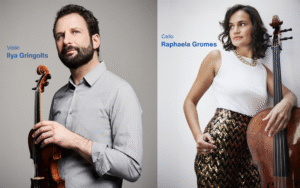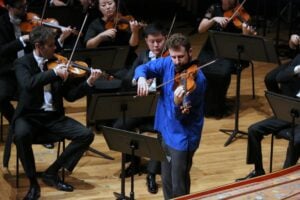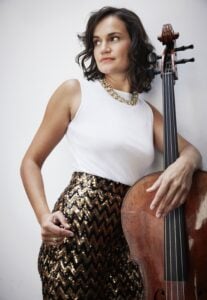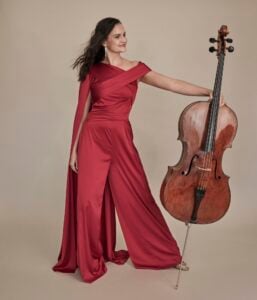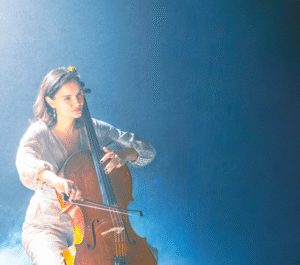Cultural Portraits: Violin Virtuoso Ilya Gringolts and Rising Star Cellist Raphaela Gromes
This September, HK Sinfonietta will enchant string instrument enthusiasts with two concerts featuring the virtuoso talents of violinist Ilya Gringolts and cellist Raphaela Gromes. Each performance promises a unique exploration of the rich textures and emotive power of string music, showcasing Gringolts’ dazzling technique and expressive artistry and Gromes’ lyrical interpretations and captivating stage presence.
Ilya Gringolts & The Firebird will be held on 13 September, and Cellomania: Raphaela Gromes Plays Dvořák on 27 September, both at Hong Kong City Hall. We had the chance to discuss with them about their musical journey and the power of music.
Born in 1982 in Leningrad (now St. Petersburg), Russia, Ilya Gringolts started learning the violin at the age of 5, encouraged by his parents, fervent music lovers. As Gringolts himself says, he knew very early that the violin would be his path forward. “My teacher Tatiana Liberova as well as my parents kept me well on that road until it was time to leave the nest. I went to New York to study with Itzhak Perlman at The Juilliard School, started a string quartet, moved back to Europe, started another string quartet, got a teaching job in Basel, another teaching job in Zurich, started a foundation to support composers and continued being on the road with violin and bow!”
In 1998, he won the International Violin Competition “Premio Paganini” and remains the youngest winner in the competition’s history. He was named a BBC New Generation Artist at the outset of his career. He is currently a Professor at the Zürich University of the Arts and has been teaching at the renowned Accademia Musicale Chigiana in Siena since 2021. He is also Artistic Advisor of the Mizmorim Kammermusik Festival in Switzerland.
He has performed with renowned orchestras such as the Los Angeles Philharmonic, NHK Symphony Orchestra, Israel Philharmonic Orchestra, Singapore Symphony Orchestra, Royal Stockholm Philharmonic Orchestra, Finnish Radio Symphony Orchestra, City of Birmingham Symphony Orchestra and Mahler Chamber Orchestra. Recent highlights include joint projects with the Bavarian Radio Symphony Orchestra, Orchestra dell’Accademia Nazionale di Santa Cecilia, Tonhalle-Orchester Zürich, Vienna Symphony Orchestra, Berlin Radio Symphony Orchestra, Bamberg Symphony, Helsinki Philharmonic Orchestra, Budapest Festival Orchestra, Orquesta de València, BBC Scottish Symphony Orchestra and Taiwan Philharmonic.
Gringolts devotes himself to great orchestral repertoire, as well as contemporary works, while maintaining a strong interest in historical performance practices. His diverse concert programmes range from virtuosic early repertoire by Leclair and Locatelli to Paganini’s solo and orchestral works. Many composers have written new works for him, most recently including Chaya Czernowin, Lotta Wennäkoski, Mirela Ivičević, Augusta Read Thomas, Beat Furrer and Bernhard Lang.
An advocate of contemporary music, he co-founded the I&I Foundation to commission new works. “I see a lot of talent in the field of contemporary music – the real issue is education and the focus given to contemporary music by promoters. It is our duty as educators to make new music available to students and to encourage them to discover it as they are the future advocates of it,” he explains.
On 13 September, Gringolts and conductor Bas Wiegers will be giving the Asian première of Chaya Czernowin’s Moths of Hunger and Awe (2023/2024), which was also premiered by them in Germany last year.
“Chaya Czernowin wrote the concerto for me recently – it was a joint commission by Munich Chamber Orchestra, Musikkollegium Winterthur, and Hong Kong Sinfonietta. I was lucky to be part of the creative process as Chaya consulted me on the various sound effects. It has become a shattering, visceral, wild — but also calming and meditative — universe where the strings create a kind of dystopian reality in which the violin, the protagonist, has to literally survive. It is an uncompromising, relentless piece of art, a masterpiece,” the violinist says with passion.
Gringolts will also perform Sibelius’s 4 Humoresques for Violin & Orchestra, Op 89. He mentions, “Sibelius’s Humoresques are little gems that I recorded years ago and have never truly come back to until now. They’re incredibly full of wit, nostalgia, and whimsy. Sibelius at his intimate best.”
The concert will also feature Beethoven’s The Creatures of Prometheus Overture, Op 43, and Stravinsky’s The Firebird Suite (1945).
Born in 1991 in Munich, Germany, the daughter of two cellists, Raphaela Gromes started taking cello lessons at the age of 4. “I was incredibly lucky to grow up surrounded by music. My first lessons were with my mother, and from the very beginning, the cello felt like a natural extension of myself. My father’s warm, singing sound was a huge inspiration to me as a child, and I always wanted to capture that quality. Music was never just a discipline for me — it was always a way of expressing joy, emotion, and connection,” she recalls with passion.
Her first appearance as soloist was in 2005 with Friedrich Gulda’s Cello Concerto and was highly acclaimed. At the age of 14, she took up her studies at the University of Music and Theatre “Felix Mendelssohn Bartholdy” Leipzig. She continued her studies in 2010 at the University of Music and Performing Arts Munich, later on at the University of Music and Performing Arts Vienna.
She won numerous prizes, among them the first prize in the Competition Richard Strauss, a scholarship of the Studienstiftung des Deutschen Volkes (German National Merit Foundation), and the first prize in the cello solo competition of the German Music Council in 2016. In 2019, she was awarded the Prize of the German Record Critics for her Offenbach release and the Bavarian Art Promotion Prize.
A true believer in the healing potential of music, Gromes is a cultural ambassador for SOS Children’s Villages worldwide and the José Carreras Leukaemia Foundation. “I believe music has an extraordinary power to open hearts and create empathy. For children especially, it can be a source of strength, confidence, and hope. In education, music teaches us to listen and that is such an important foundation for building respectful, supportive communities. Having lost my father to leukaemia, I feel deeply connected to the work of the José Carreras Foundation, and I am very grateful for their tireless efforts. As ambassador for SOS Children’s Villages, I’ve also seen how music can give young people courage to believe in their future. For me, it’s about using music as a bridge between people, cultures, and generations,” she explains with great empathy.
Emotional connection is essential for the cellist, with both the audience and the orchestra. “The greatest reward is the moment when music truly reaches people — when I feel that the audience, the orchestra, the conductor and I are breathing together in the same phrase. Those magical moments of flow, when we all on stage feel the same and merge perfectly into one, are unforgettable. And even more so, when we are able to express what the composer wanted to say, when we truly come close to the real intention of the music and stand entirely in its service. These moments remind me why I do what I do,” she articulates.
On 27 September, she will make her HK début with Hong Kong Sinfonietta, performing Dvořák’s Cello Concerto in B minor, Op 104, under the baton of Music Director Christoph Poppen.
“I will be performing Dvořák’s Cello Concerto in B minor, a work that has accompanied me throughout my life and that I feel deeply connected to. It embodies a wide emotional spectrum — moments of fiery heroism, soulful lyricism, and profound intimacy. Dvořák wrote it during a time of homesickness and grief, and that sense of longing, of both loss and love, runs through the music,” she explains.
“My relationship with Dvořák’s Concerto was profoundly strengthened through my encounter with Ukraine during wartime. In December 2023, I played it with the Ukrainian National Symphony Orchestra in Kyiv in a concert marked by air raid alerts and deep emotional intensity. Afterward, a soldier, who had just returned from the front, told me that music was the only thing that had made him feel human again. That experience taught me that music can carry solace, resistance, and humanity in ways nothing else can,” she recalls.
This concert with HKS will be her Hong Kong début. “Meeting a new audience and new orchestra is like opening a new chapter, and I’m curious to see how the atmosphere, the energy, and the people will shape the experience. I am especially excited to perform with the fantastic Hong Kong Sinfonietta and to share the stage with Christoph Poppen, with whom I share a long and very inspiring collaboration. Hong Kong has such a rich cultural life, and I feel honored to contribute my voice to it,” she shares with enthusiasm.
The concert will also feature Richard Strauss’ Serenade in E-flat for 13 Wind Instruments, Op 7, Giacinto Scelsi’s Ohoi: The Creative Principles for 16 Strings (1966) (Hong Kong première), and excerpts from Mozart’s Serenade No 10 in B-flat, K361, “Gran Partita”.
More details about the concerts can be found here:
13 Sept – Ilya Gringolts & The Firebird
27 Sept – Cellomania: Raphaela Gromes Plays Dvořák
